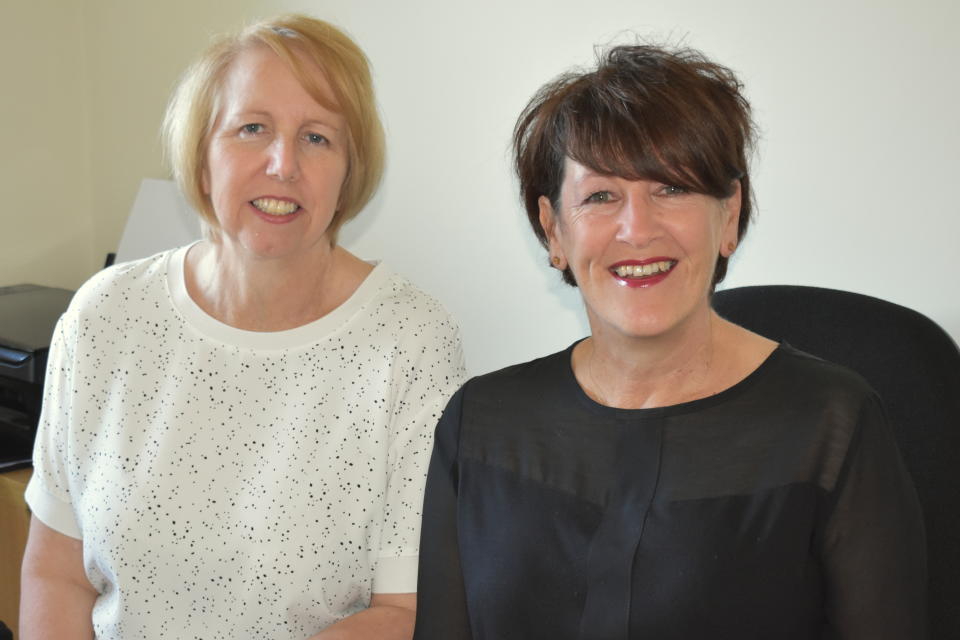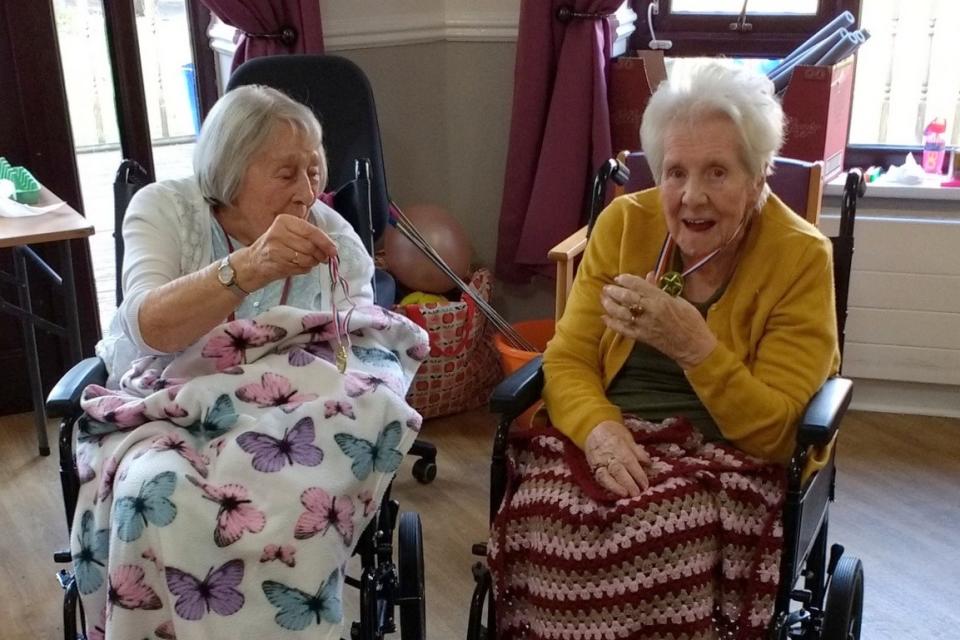'I'm never smiling again': How it feels to watch your mum fall apart through a care home window

“I’m never smiling again.”
These are the miserable words Jean Morrison uttered as her daughter, Jenny Morrison, visited her care home three months ago. Only it could barely be counted as a visit.
Morrison, like thousands of other daughters and sons of care home residents during the coronavirus pandemic, was only able to see her mother by peering through a window, due to rules preventing indoor visits.
These window visits were doubly difficult as Jean suffers Alzheimer’s and dementia, meaning she was left confused and distressed by the sight of her daughter standing outside.
During one visit to Kemp Lodge Care Home in Liverpool in August, the despair had become intolerable for Morrison’s 87-year-old mum.

“It was the most distressing situation I’ve ever encountered,” Morrison told Yahoo News UK. “My mum just didn’t have a clue why we couldn’t come in, and why we’d [stopped visiting inside the home].
“My partner, Diane, and I went up to the window. Mum just absolutely broke down in tears. She couldn’t stop, uncontrollable. We were on the outside of the window and couldn’t comfort her in any way at all.
“Diane banged on the window and said: ‘Listen, Jean, I’m going to get you smiling.’ She looked up and said: ‘I’m never smiling again.’”
It was this encounter, six months after their last meaningful contact with Jean, that prompted the pair to launch the Rights for Residents campaign group, calling for an end to “inhumane restrictions” on people visiting relatives in care homes across the country.
Watch: Carer on the devastating impact of the pandemic on care homes
Its petition – “Please let me see my family before it's too late!” – gathered more than 200,000 signatures.
On a personal level, 55-year-old Morrison was actually allowed to have contact with her mum a month ago when she was forced to transfer care homes.
However, this was only allowed through a special exemption to prevent Jean suffering “transfer trauma”, and Morrison knows most other families have been unable to see their relatives in care homes for nine months due to the pandemic.
Tough guidance on care home visits continued during the recent national lockdown.
There was finally good news – and a victory for the Rights for Residents campaign – on Tuesday evening as health secretary Matt Hancock announced more than one million rapid turnaround tests will be sent to care homes, a move which will allow visits to take place from Wednesday onwards.

While cautiously welcoming the news, Morrison says considerable damage has already been done. “My mum’s nickname was ‘Smiler’. She was always in a good mood, smiling, laughing. But she became more and more depressed.
“She was glowing in March [shortly before the first national lockdown was imposed]. Now her mental and physical health has deteriorated beyond belief. It’s at a critical stage now.”
Morrison, who ran an online furniture business before it folded due to the pandemic, says her mum was still able to chat in March and ask for things she wanted. Now she can barely speak, and screams when carers come near her.
“Though she would have deteriorated anyway because of her condition, we know this period of separation has exacerbated it,” Morrison says.
“It’s hard to believe that nine months on, these people living in care homes – our relatives – were the only people in society not allowed to have contact with their families.”
Just as profound has been the stress Morrison herself has endured over the past nine months.
“This has almost broken me as a person. I can’t describe the feeling of guilt that I’ve got. I went to visit my mum at the window and she called me to come in. You go away thinking: ‘What was she thinking?’
“I get up in the morning and I think about it, and I think about it any spare minute that I’ve got in the day. And then in the night I can’t sleep. I can’t remember the last time I slept through the night.”
Morrison and her three sisters were forced to put Jean in a care home three-and-a-half years ago when she ended up in a wheelchair after a fall in her house.
They used to share five full-day visits inside the care home per week – which became zero during the pandemic.
“The thought that she spends these days on her own, locked in her room, is absolute torture for me. We feel like we’ve let her down.”
At this point, Morrison bursts into tears.

“All the things your parents do for you,” she continues, “and I feel like this is the way she is getting repaid. It’s so cruel.”
She adds: “Many people in the Rights for Residents group are losing people now. They are left with this terrible legacy where they just weren’t able to be with them.”
For Morrison, it comes down to a lack of “compassion” for people who “don’t vote”.
“The most vulnerable in our society… they’re just not valued by this government. Just because these people aren’t economically active or don’t vote… they still matter.
“We’ve heard all the way through about the mental health of students, children, elderly people. All of that is really valid but it never gets mentioned about people in care homes by the government. I think that’s quite shocking – and it shows they have got no compassion for these people.”
The government’s rollout of rapid turnaround tests in care homes will allow two visits a week if the visitors test negative for COVID. Visits will be permitted in all three tiers of the government’s local restrictions system.
Announcing the scheme on Tuesday, Hancock insisted the strict rules on care home visits had been necessary.
According to Office for National Statistics (ONS) figures released earlier that day, there had been 17,319 COVID deaths in care homes in England and Wales up to the week ending 20 November.
Hancock said: “I know how difficult it has been for people in care homes and their families to be apart for so long. The separation has been painful but has protected residents and staff from this deadly virus.
“I’m so pleased we are now able to help reunite families and more safely allow people to have meaningful contact with their loved ones by Christmas.”
Read more:
The Tier 3 COVID lockdown rules explained
The Tier 2 COVID lockdown rules explained
What tier are you in? Full list of lockdown areas
Watch: How England's new three-tier COVID system will work

 Yahoo News
Yahoo News 
